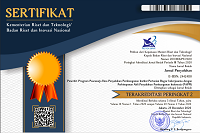The Role of Creative Social Energy in Strengthening Ecological Adaptation Capacity Through Community Empowerment
Abstract
Investments in large companies engaged in natural resource management have the potential to cause conflict, which requires an alternative model of conflict potential management. This study aims to analyze the development of creative social energy as an alternative to managing potential conflicts through empowering community food security. This study uses a participatory action study method for community empowerment and cybernetic triangulation methods in extracting data. Communities in the company's operational Ring1 area carried out community empowerment efforts by placing extension workers as community assistants. The results of the study show that community empowerment through a participatory extension approach is effective in supporting the realization of community welfare through increased income. Participatory community empowerment is effective in developing creative social energy. There is a close relationship between community empowerment and strengthening creative social energy and increasing the ecological adaptation capacity of society to the dynamics of environmental change. The ecological adaptation capacity of the community develops in line with the level of community empowerment. Community empowerment through effective participatory counseling is a model for managing potential conflicts in CSR programs. Extension workers with participatory community empowerment competencies are a key factor in the success of community empowerment.
Downloads
References
Aminah S., Sumardjo, DP. Lubis, and D. Susanto (2015). Factors affecting peasants’ empowerment in West Halmahera District – a case study from Indonesia. Journal of Agriculture and Rural Development in the Tropics and Subtropics. 116 (1): 11-25.
Bordeou, P. (1986). The Forms of Capital. In Handbook of theory and research for the sociology of education, edited by J. G. Richardson. New York: Greenwood Press.
Coleman, JS. (1988). Social Capital in the Creation of Human Capital. American Journal of Sociology. 94: S95–S120. CiteSeerX 10.1.1.208.1462. doi:10.1086/228943. JSTOR 2780243.
Malta, M., Sumardjo, S., Fatchiya, A., & Susanto, D. (2018). Keberdayaan Transmigran dalam Berusaha Tani di Kabupaten Banyuasin dan Ogan Ilir Provinsi Sumatera Selatan. Jurnal Penyuluhan, 14(2). https://doi.org/10.25015/penyuluhan.v14i2.19039
Managanta, A. A., Sumardjo, S., Sadono, D., & Tjitropranoto, P. (2019). Factors Affecting the Competence of Cocoa Farmers in Central Sulawesi Province. Jurnal Penyuluhan, 15(1). https://doi.org/10.25015/penyuluhan.v15i1.20966
Managanta, A., Sumardjo, S., Sadono, D., & Tjitropranoto, P. (2018). Influencing Factors the Interdependence of Cocoa Farmers in Central Sulawesi Province, Indonesia. International Journal of Progressive Sciences and Technologies, 8(1), 106-113. Retrieved from https://ijpsat.ijsht-journals.org/index.php/ijpsat/article/view/394
Mutmainah R. dan Sumardjo (2014). Peran Kepemimpinan Kelompok Tani dan Efektivitas Pemberdayaan Petani. Sodality: Jurnal Sosiologi Pedesaan. https://doi.org/10.22500/sodality.v2i3.9425
Putnam, RD. (1995). Bowling alone: Americas´s declining social capital. Journal of Democracy. 6 (1): 65–78. doi: 10.1353/jod.1995.0002.
Sulistiani I., Sumardjo, N. Purnaningsih (2018). Model and Communication Strategy Development in Developing Social Energy for Papua Community Empowerment. Medwell Journals: The Social Science. 13 (4): 934-942.
Sulistiani I, Sumardjo, Ninuk Purnaningsih N, Sugihen BG. (2017). Komunikasi Pembangunan Dalam Pengembangan Energi Sosial Budaya Untuk Keberdayaan Masyarakat Di Papua. Jurnal Pikom. 18 (12): 43-56.
Sumardjo, Firmansyah A, Dharmawan L, Wulandari YP. (2014). Implementasi CSR Melalui Program Pengembangan Masyarakat: Inovasi Pemberdayaan Masyarakat PT. Pertamina EP Asset 3 Subang Field. Penerbit: CARE IPB. Bogor.
Sumardjo, Burhanduddin, R. Riyanto, S. (2019). Energi Sosial Budaya Kreatif: Inovasi Dalam Penguatan Ketahanan Pangan di Daerah Rawan Konflik. Laporan Akhir Tahun Penelitian Perguruan Tinggi tahun 2017. Tidak dipublikasikan. Kerjasama LPPM IPB dengan Kemenristek Dikti.
Sumardjo, Firmansyah A, and Manikharda (2018). Community adaptation on ecological changes through urban farming innovation for family food security. In Rilus A. Kinseng, Arya Hadi Dharmawan, Djuara Lubis & Annisa Utami Seminar (Eds.), Proceedings of The International Conference on Rural Social Economic Transformation: Agrarian, Ecology, Communication and Community Development Perspectives (p. 27-34). Bogor: IPB University.
Sumardjo (1994). Energi sosial budaya kreatif dalam Sayogyo (1994). Kemiskinan dan pembangunan di Provinsi Nusa Tenggara Timur. Jakarta: Yayasan Obor Indonesia.
Sumardjo (2010). Penyuluhan menuju pengembangan kapital manusia dan kapital sosial dalam mewujudkan kesejahteraan masyarakat. Orasi Ilmiah Guru Besar Tetap Fakultas Ekologi Manusia, IPB Bogor 18 September 2010.
Wahyuni, S., Sumardjo, S., Lubis, D. P., & Sadono, D. (2017). Hubungan Jaringan Komunikasi dan Dinamika Kelompok dengan Kapasitas Petani dalam Agribisnis Padi Organik di Jawa Barat. Jurnal Penyuluhan, 13(1), 110-120. https://doi.org/10.25015/penyuluhan.v13i1.15115
Authors who publish with this journal agree to the following terms:
- Authors retain copyright and grant the journal right of first publication with the work simultaneously licensed under a

This work is licensed under a Creative Commons Attribution 4.0 International License that allows others to share the work with an acknowledgement of the work's authorship and initial publication in this journal. - Authors are able to enter into separate, additional contractual arrangements for the non-exclusive distribution of the journal's published version of the work (e.g., post it to an institutional repository or publish it in a book), with an acknowledgement of its initial publication in this journal.
- Authors are permitted and encouraged to post their work online (e.g., in institutional repositories or on their website) prior to and during the submission process, as it can lead to productive exchanges, as well as earlier and greater citation of published work (See The Effect of Open Access).















